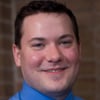Have you ever thought about the hymns that start with the word “now”? There’s an immediacy to these texts, a context that opens up with the first word. “Now it is evening…,” “Now the day is over…,” “Now the silence…” We know right away where we are in the day, in the year, in the worship service.
That immediacy can also make us wonder what came before. If “now” it is evening, what was the day like? If “now” we should all thank our God, what led to us being thankful? These hymns usually don’t tell us explicitly. We start singing these texts in the middle of things, when it’s already evening, or the green blade has already started rising, or we’ve already joined in celebration.
And so, we begin All Creation Sings in the middle of things, turning to the very first hymn and singing “Now the heavens start to whisper, as the veil is growing thin” (ACS 901). Here again is that immediacy in the text, placing us right “now” at the start of Advent, without time to wonder what came before or how we got here. We’re surrounded by the stirring earth, the seeds awaiting the spring, the promises of the prophets, and the swirling clouds of change that infuse the early lectionary texts of each Advent cycle. Mary Louise Bringle crafted a text that starts us on our journey right away, from the very first word.
The word “now” also implies that this isn’t just about prophets and scripture and stories we’ve heard for generations. It might also mean…now. This now. Today now. Heavens were whispering not just for Jesus’ birth 2,000 years ago; they also whisper today. The seed of promise, planted for the healing of the world, is still waiting and stirring today. Christ is gleaming like the morning star today. This is a hymn that places us in the story while also calling us to our present moment.
But, what “us” is actually present in the text? Bringle brilliantly de-centers humanity as being the only part of creation that matters. The first two lines don’t mention humans at all. In the third and fourth lines, we have a mention of Jesus and the implication of hearts in action, but that’s it. Even then, it’s not clear whose hearts are being sung about: our own? other people’s? creation’s?
It’s not until the final stanza that we have more people mentioned, but even then it’s not about us. Instead, the text mentions the lonely, the stranger, the outcast, those we would prefer to hide from our view. Only in the last line of the hymn do we finally have a mention of those of us singing, and the “our” comes as an imperative to “teach our hearts to welcome you.”
I love “Now the Heavens Start to Whisper” because it starts with the word “now,” launching us immediately into the season of Advent. I love it because the word “now” proclaims that the waiting and expectation continue in our present, inviting us to imagine a world where God’s realm is present on earth. But I also love that our new worship supplement, All Creation Sings, starts with a hymn that lets creation sing first. It lets God’s imagination and Christ’s love sing first. It lets those who are lonely, outcast, and hidden be named first. And it’s only after we’ve listened to creation and listened to our neighbors that we are able to ask to learn their song—the Advent song of all creation—which is already in the middle of singing God’s wonder.
More “Now” hymns to ponder:
Now all the vault of heaven resounds (ELW 367)
Now behold the Lamb (ELW 341)
Now is the time of grace (ACS 918)
Now it is evening (ELW 572)
Now rest beneath night’s shadow (ELW 568)
Now thank we all our God (ELW 839, 840)
Now that the daylight fills the sky (ACS 992)
Now the day is over (ELW 570)
Now the green blade rises (ELW 379)
Now the heavens start to whisper (ACS 901)
Now the meal is over (ACS 983)
Now the silence (ELW 460)
Now to the Holy Spirit let us pray (ELW 743)
Now we join in celebration (ELW 462)
Now We Remain (ELW 500)
